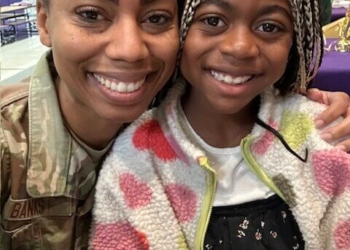Despite a recent increase in military spouses running for public office, there are still no active-duty military spouses serving in Congress. But there is a veteran spouse with a record of championing military family issues since taking office. Rep. Cathy McMorris Rodgers’ personal military connection has helped bridge the gap between military families and politics.
“I’ve always said that when someone joins the military, it’s not just the job, it’s a family commitment to our country. And clearly military families face a unique set of challenges,” said McMorris Rodgers.
The role of the Congressional Military Family Caucus

McMorris Rodgers married retired Navy Commander Brian Rodgers in 2006, the year after she started serving in Congress as a representative for Washington’s fifth district. Just three years later in 2009, McMorris Rodgers joined Rep. Sanford D. Bishop, Jr. in founding the Congressional Military Family Caucus. The annual caucus covers topics including education, the Exceptional Family Member Program, PCS’ing, child care, health care, housing, spouse employment and more.
In 2020 the caucus was a virtual event, featuring legislators, service members, military spouses, and leaders from the military and nonprofit sectors.
“Our goal was to put that microphone in front of our military families, to highlight issues that were important to them,” said McMorris Rodgers. “And at the beginning it felt like we were hearing from more government officials, but through the years, the dynamics have really changed for the better. And we’re engaging in some really incredible dialogue, to figure out what the problems are and how we can fix them.”
Military family legislation
In addition to being the co-chair of the caucus, McMorris Rodgers is pursuing legislation that benefits military spouses and families. One example is her proposal to extend the Work Opportunity Tax Credit to military spouses.
“This legislation would serve to incentivize employers to recruit and hire military spouses by providing them a tax credit,” said Sue Hoppin, founder and president of the National Military Spouse Network. “Given the opportunity, military spouses prove themselves to be great assets; this will help them get their foot in the door.”
Coincidentally, Hoppin was a guest speaker at last year’s caucus event.
Another bill that McMorris Rodgers is hoping to sponsor is the formation of an EFMP advisory committee. McMorris Rodgers, along with co-sponsor Congressman Joe Wilson, would, “go a long way in really making sure that our EFMP families, those that have one or more children with special needs … would have more of a focus because they have unique challenges.”
EFMP was also on the docket at last year‘s caucus and has recently received congressional attention having been a primary focus of the 2021 NDAA military family provisions.
The power of participation
McMorris Rodgers encourages families to reach out to their legislators.
“As you share your story, it opens up the understanding as to what that means for the military family in the 21st century.”
Despite many legislators’ efforts to listen and learn, the reality is helping military families is not always a slam dunk. Politics involves bringing attention to issues and building community support. There are 435 members in the House of Representatives and 100 members in the Senate, all of whom have their own priorities or legislation that they’re working on to represent the needs of constituents.
But because military families do not always “belong” to one community, in the traditional sense, it is important for families to share their stories. One example for how families can share their story is by attending the 2021 caucus and asking questions. The theme of the October event will be military family readiness post-COVID-19.
And, attendees’ questions have proven to impact legislative change. Last year someone asked, “Although DOD-sponsored committees currently exist to examine military family readiness, these organizations do not actively publicize their meetings other than through the Federal Register. This makes it difficult for a new military family to participate. Additionally, while public comment is read, it is not commented on by those holding a seat on these councils. In order to help represent all military families, would the DOD consider requiring DOD-organized committees to address these public comments?”
Fast-forward to 2021 and all Department of Defense Advisory Committees are under review. Coincidence? Maybe, but military-affiliated representatives, like McMorris Rodgers, encourage all military family members to engage with elected leaders on the issues impacting households most. Connect with the Congressional Military Family Caucus on Facebook for updates on upcoming events.
Read comments






































